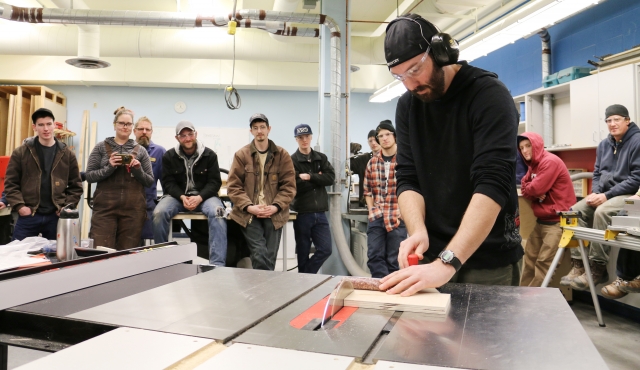No More Fingers Amputated
Selkirk College Carpentry Program Purchases Finger-Saving Table Saws
NELSON – The Selkirk College Carpentry Program shop has become a safer place to learn with the addition of three top end table saws that employ the latest flesh-saving technology.
Using an elk sausage, Carpentry Instructor Dan Brazeau held a demonstration of the new industrial SawStop table saw that uses an electrical signal to stop the blade in less than five milliseconds when flesh is detected.
“A school should be the safest spot possible, so it’s important to have the latest technology,” said Brazeau.
As more than 50 students and instructors from all of the Silver King Campus trades programs looked on, Brazeau demonstrated how the technology can prevent nasty accidents. He first ran the sausage through the blade without the safety system activated and it didn’t turn out well for the elk meat. Then using the monitoring system, the blade dramatically stopped without leaving a mark in the sausage.
“The idea is to limit flesh cutting,” said Brazeau. “If you did have an accident, you get a nick instead of a cut.”
SawStop is one of the leading suppliers of table saws in the United States and across the world. Located just south of Portland, Oregon, the technology was invented in 1999 and in 2004 the first SawStop table saw was sold. SawStop claims that there is a table saw accident every nine minutes in the United States and 10 amputations every day.
Ten times faster than a car’s airbag, the SawStop braking system, uses flesh as a sensor to activate a brake cartridge that takes the saw from 4,000 rpms to zero in the blink of an eye. If activated, the brake cartridge and saw blade need to be replaced (total cost of around $150), but the saw itself is not damaged. Most importantly, the user of the equipment gets away without injury.
The old table saws at the Selkirk College carpentry shop had aftermarket safety features incorporated, but the new equipment is the best in the business. Each saw cost $5,000 and was made possible through recently released provincial government funding aimed at in-demand trades.
“We would not have been able to afford this without the provincial government funding,” said Brazeau.
The demonstration sacrificed one of his prized elk sausages, but Brazeau said the focus on safety was well worth it.
Find out more about the Selkirk College Carpentry Program at: http://selkirk.ca/program/carpentry-foundation
























